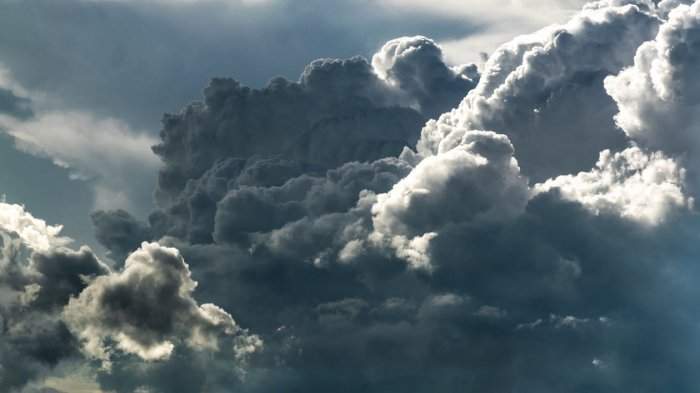
Why does the cloud not fall to the ground? Interesting question. This is the answer
Clouds come from the process of evaporation of water on the surface of the earth, lake water, sea, river, and other water. As a result of heating, especially the heating of the sun, water evaporates, then water vapor drifts into the sky due to the mild nature of water vapor. At a certain height at the equilibrium point due to the stable air pressure from the surroundings, pressure from the bottom, top, and side, moisture collection will stop and form clouds. Clouds are formed because water vapor is at the height of the sky where the temperature is cold so that it undergoes compaction (condensation) into a liquid (dew) or solid (ice crystal) form.
Clouds consist of a large collection of particles or ice granules. Ice grains that form clouds are very small in size, do not stick to one another, and are light. Hot air pressure from the earth in the form of an upward flow of air can sustain weight or withstand gravity so that the cloud does not fall.
But at night and early morning if the air pressure is low, which is common in mountainous areas, clouds can come down to earth in the form of fog or clouds that are not concentrated. In mountainous areas with altitudes above three thousand meters above sea level, even thick clouds of clouds have the opportunity to drop the surface of the earth, cover the top of the mountain, but do not fall into a hut !!!. When the morning sun shines, the air temperature gradually rises and slowly the fog that surrounds the mountain peak will also rise to the sky.
The cloud will move from the area of high air pressure to the area of low air pressure carried by the wind which pushes it. In areas of low air pressure and low temperatures, clouds will meet in large numbers and form small ice / snowflakes. If the granules of united ice will be larger in size. When the temperature of the air in the atmosphere exceeds the melting point of ice, the ice particles that form clouds will change shape into water droplets. When air pressure is unable to support the cloud in the form of water or snow granules, water droplets or snow will fall which is called rain if warm air or snowfall if the air is very cold.
Clouds will fall to the earth in the form of water if the surrounding air is lower than the melting point of ice at a certain humidity level. Larger grains of water will fall to earth, but small ones if supported by conditions of low air humidity will evaporate again into the sky because when friction with air causes heat.
Posted using [Partiko Android](https://steemit.com/@partiko-android)
 hiveblocks
hiveblocks